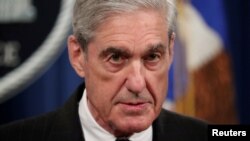When Robert Mueller testifies to the U.S. Congress on Wednesday, Democratic lawmakers are expected to try to pin down the former special counsel on a crucial question: did he intend for them to carry on where he left off in his investigation of President Donald Trump and the Russians?
As Democrats craft their agenda heading into the 2020 elections in which the Republican president is seeking a second four-year term, they will be eager to hear from Mueller about the findings of his 22-month inquiry before deciding how they should tackle its unanswered questions.
It is unclear how cooperative Mueller, a 74-year-old former FBI director and federal prosecutor, will be and whether he will stray far from the text of his 448-page report on the investigation, which Trump's Justice Department released only in redacted form in April.
The report found that Russia interfered with a campaign of hacking and propaganda in the 2016 presidential election to boost Trump's candidacy. It found that people in Trump's election campaign had numerous contacts with Russians. But it concluded there was insufficient evidence to establish a criminal conspiracy between Trump's team and Moscow.
The report also described numerous instances in which Trump tried to impede Mueller's inquiry, but made no judgment on whether that amounted to criminal obstruction of justice by the president.
Mueller is due to testify before two Democratic-controlled House of Representatives committees.
Here are some of the lines of questioning that lawmakers may pursue with Mueller, according to congressional aides and committee members.
Mueller and Barr
Democrats are expected to ask whether Mueller was told to end his investigation by Attorney General William Barr, a Trump appointee who they have accused of acting to protect the president.
They will want to hear Mueller's views on how Barr presented the report as an exoneration of Trump and Barr's conclusion after receiving the report that the president did not commit obstruction of justice. Democrats have accused Barr of deceptively spinning the report's findings to protect his boss.
Mueller himself has criticized Barr's initial public account of the report's conclusions, saying in a letter that the attorney general did not fully capture the context, nature and substance of the investigation. Barr's initial description of the conclusions was contained in a March 24 letter to Congress that prompted Trump to claim "complete and total exoneration." The report was not released until April 18.
Republicans, in the minority in both committees that will hear from Mueller, may look to underscore Barr's obstruction determination to emphasize their view that the matter should be dropped.
House Democrats are deeply divided over whether to launch the impeachment process set out in the U.S. Constitution for Congress to remove a president from office for "high crimes and misdemeanors." Longstanding U.S. Justice Department policy bars criminal charges against a sitting president.
Obstruction and Congress
Democrats will be keen to pry out of Mueller any indication of whether his work on the obstruction issue was meant to furnish Congress with evidence for subsequent investigations.
They are also expected to ask Mueller about passages in the report that stress the authority of Congress to protect the U.S. judicial system against corrupt acts by a president.
Trump has claimed that Mueller found "no collusion" with Russia. Republicans have asserted that Mueller meant only for Congress to consider reforming laws concerning obstruction of justice.
The report describes a series of episodes relating to potential obstruction of justice by Trump, especially his efforts to oust Mueller. The report said the special counsel sought to "preserve the evidence" in case of future investigations.
The report stated that "if we had confidence after a thorough investigation of the facts that the President clearly did not commit obstruction of justice, we would so state. ... Accordingly, while this report does not conclude that the President committed a crime, it also does not exonerate him."
The two-part report's section on obstruction refers to the corrupt exercise of presidential powers and the authority of Congress to protect against obstructive acts.
One reference contains the Mueller team's conclusion that Congress has the authority to impose obstruction-of-justice statutes "on the president's official conduct." The report also concludes with a curious reference to U.S. case law: "the protection of the criminal justice system from corrupt acts by any person - including the president - accords with the fundamental principle of our government that 'no person in this country is so high that he is above the law.'"
No conspiracy?
Along with the claim of "no collusion," Trump and his Republican allies have said Mueller concluded there was "no conspiracy" between the president's campaign and Russia. That is not exactly what Mueller found. His report concluded that the investigation "did not establish" that the campaign engaged in a criminal conspiracy with Russia but that this "does not mean there was no evidence of those facts."
The Mueller team said the inquiry did not assemble "a complete picture" of what occurred because of difficulties in obtaining admissible evidence and testimony. Trump himself refused to submit to a sit-down interview with the special counsel.
Several people affiliated with the Trump campaign lied to investigators or gave incomplete evidence. Others invoked their right against self-incrimination under the U.S. Constitution's Fifth Amendment. Some information was subject to legal privilege and "screened" from investigators. Campaign affiliates deleted communications or used encrypted phone apps that prevented long-term data retention.
As the Mueller report concluded: "given these identified gaps, the Office cannot rule out the possibility that the unavailable information would shed additional light on [or cast in a new light] the events described."





























